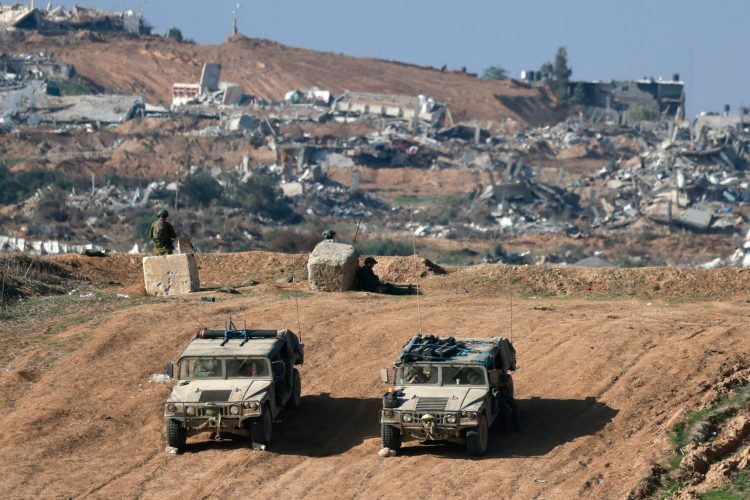Following the recent Israeli military offensive in Gaza, there has been a surge in global condemnation, intensifying demands for accountability and cessation of hostilities. Yet, beyond raising international concerns about Israel’s actions, the conflict has sparked a diplomatic standoff between Germany and Ireland. The core of the dispute focuses on Germany’s alleged choice to provide further military equipment to Israel despite substantial evidence of war crimes in Gaza. This decision has strained diplomatic ties and prompted widespread protests in Ireland, highlighting the seriousness of the situation and the escalating tensions between these two nations.
Irish Protests Against Germany Amidst Diplomatic Tensions Over Israel’s Actions
The recent Israeli military offensive in Gaza has ignited global outrage and demands for accountability. Yet, amidst this widespread condemnation, tensions between Germany and Ireland have surged over reports of Germany providing extra military equipment to Israel. Ireland, alongside various international bodies, has voiced alarm regarding the continuous supply of arms despite clear evidence of war crimes in Gaza. Germany’s decision has triggered Irish protests, signalling discontent over exporting nations’ perceived involvement in the severe breaches of international law unfolding in the region.
Germany-Ireland Diplomatic Tensions Intensify Over Continued Arms Transfers to Israel
As the conflict in the Middle East escalates, diplomatic tensions between Germany and Ireland have reached a critical point, and despite the UN Human Rights Council’s urging to refrain from transferring arms when there is a clear risk of serious violations, Germany, along with the US and the UK, reportedly decided to supply additional military equipment to Israel. The continuation of arms transfers in the face of overwhelming evidence of war crimes has strained relations between Germany and Ireland. The Irish government, aligned with international legal obligations and humanitarian principles, condemns these actions and calls for an immediate cessation of arms transfers, heightening the diplomatic tensions between the two nations.
Irish Protests Against Germany Erupt Amidst Far-Right-Fueled Violence
The recent riots in Dublin, marked by unexpected levels of violence during evening rush hour, have taken on a new dimension as Irish citizens express their discontent not only with domestic issues but also with perceived external influences. While the disturbances surprised many, the possibility for such disquiet was described as “always under the surface” by Booker Prize-winning novelist Paul Lynch. The riots were triggered by a multiple stabbing incident in Dublin’s north inner city, and elements of the far-right, leveraging anti-immigrant sentiment, played a significant role in exacerbating the situation. As the chaos unfolded, unconfirmed reports linking the attacker to immigration intensified the unrest, revealing a deeper-seated tension surrounding immigration issues in Ireland. Amid these events, Irish protests against Germany have emerged, drawing attention to the country’s reported decision to supply additional military equipment to Israel, further contributing to diplomatic tensions between the two nations.
Germany-Ireland Diplomatic Tensions Exacerbated by Far-Right Surge
The recent violent events in Dublin have not only exposed the social and economic challenges facing Ireland but have also heightened diplomatic tensions between Germany and Ireland. The far-right movement, which has gained traction in Ireland over the past year, exploited the riots, instigating city-wide destruction fueled by anti-immigrant sentiments. The far-right’s role in spreading misinformation and manipulating social media to influence public opinion has added a new dimension to the ongoing diplomatic tensions. Ireland’s far-right surge, primarily fueled by concerns about immigration and social issues, has created a complex backdrop for international relations. As Germany faces criticism for its reported decision to supply additional military equipment to Israel, the intertwined dynamics of domestic unrest and international relations underscore the multifaceted challenges confronting both nations.
German Embassy Protest Organizers Face Backlash Amid Irish Solidarity with Palestinians
Ireland’s recent vote in support of a United Nations resolution advocating for an immediate humanitarian ceasefire between Israel and Hamas has stirred diplomatic tensions and drawn diverse reactions. While the Irish government’s position aligns with the ceasefire call, several prominent diplomats, including Israel’s Foreign Minister Eli Cohen, have publicly portrayed Ireland as a challenging arena for Israel within Europe. Adding to the dialogue, the German Embassy in Ireland referenced German Vice Chancellor Robert Habeck’s remarks on anticolonialism and antisemitism, framing it as a pointed reminder to Ireland. The fallout in diplomatic relations and ensuing public discourse have resulted in a backlash against organisers of protests at the German Embassy, shedding light on the intricate dynamics surrounding Ireland’s foreign policy stance regarding the Israel-Palestine conflict.
Irish Solidarity with Palestinians Sparks Diplomatic Strife as German Embassy Weighs In
Ireland’s unwavering solidarity with Palestinians, evident in its recent vote and historical positions on the Israel-Palestine conflict, has become a focal point of tension in diplomatic relations. The German Embassy’s intervention, emphasising the importance of avoiding antisemitism in anticolonialism, adds another layer to the discourse. As Ireland continues to be perceived by some as one of the most hostile countries in the European Union towards Israel, the public sentiment and diplomatic repercussions are unfolding. Amid this backdrop, German embassy protest organisers are finding themselves entangled in the broader narrative of Irish solidarity with Palestinians, contributing to the ongoing complexities in international relations.
Irish-German Diplomatic Dispute Emerges Amid Discussions on Transitions and Transformations
A conference at the Royal Irish Academy exploring transitions and transformations in Germany, co-hosted by ARINS, Maynooth University, and the German Embassy, took an unexpected turn as it became a backdrop for a brewing Irish-German diplomatic dispute. The event, featuring German Ambassador Cord Meier-Klodt and Ireland’s Minister of State for European Affairs and Defence Peter Burke, delved into post-unification German experiences and the broader context of European relations. However, with references to Ireland’s solidarity with Palestinians and the complexities of Irish unification, the discussions triggered tensions, highlighting the delicate diplomatic landscape between the two nations.
Irish Solidarity with Palestinians Sparks Debate at German Embassy Conference
Amid discussions on transitions, transformations, and legacies, Irish solidarity with Palestinians emerged as a focal point, sparking a lively debate during the German Embassy conference. Minister Peter Burke’s speech, touching on Ireland’s relations with Germany and the European Union, took an unexpected turn as it navigated through historical references, including President Michael Higgins’ visit to Leipzig and the importance of the European project. The juxtaposition of these sentiments with Ireland’s stance on humanitarian truce in Israel and support for Palestinian causes stirred the diplomatic waters, laying the groundwork for a potential Irish-German diplomatic dispute. The conference shed light on the complex interplay between historical legacies, contemporary geopolitics, and diplomatic sensitivities between the two nations.
Diplomatic Fallout
In the wake of the Israeli military offensive’s aftermath, the diplomatic rift between Germany and Ireland introduced added complexity to the global response. Ongoing protests in Ireland mirror public discontent over Germany’s alleged involvement in the conflict, highlighting the urgency for a comprehensive resolution to the underlying problems. These unfolding events shed light on the intricate nature of international diplomacy amidst humanitarian crises and regional conflicts.





























